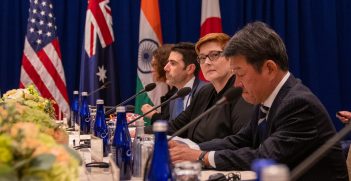In Search of a Cure for the Infodemic

The misinformation surrounding the COVID-19 pandemic has demonstrated that in the area of social media, there is a need for a quality review. This raises the question of whether there is a need to quiet public participation in politics.
On 9 November 2020, vaccine developers from New York-based Pfizer and German-based BioNTech indicated their development of two respective vaccines with over 90 percent efficiency ratings. This news has captured the world’s attention, triggering a hurried rush to the finish line reminiscent of the space race that captured the world nearly seven decades ago. But as one pandemic seems to be in the early stages of a resolution, another is exponentially accelerating in severity. To the World Health Organization, this second pandemic has been coined “the infodemic.” To others, it may simply be recognised as the misinformation crisis, which has plagued the Internet and social media platforms for the past decade and beyond.
The advent of COVID-19 has created a sense of virtual community in a way not previously comprehendible to citizens of this age. The narrative of disease has united us online in chat forums, news threads, and Zoom calls. While some have heralded this age as a chance to reset, with resetting comes the illumination of inadequacy. And while e-unity deserves to be acknowledged, in increasing instances, digital platforms have emerged as echo chambers which mirror the political schisms that increasingly characterise world affairs.
There has been a gradual crescendo in the infodemic throughout the month of November, not only from an acceleration in anti-vaccination content, but also assisted by US President Donald Trump’s accusations of a false electoral victory for Joe Biden. Cries of a post-truth era have been beaten to a pulp. No one denies the existence of fake news or the glaringly hegemonic public despondence towards political institutions. However, in the case of anti-COVID-19-vaccine propaganda, social media regulators and government officials with the keys to the information kingdom are finally beginning to lock the gates, or at least close them after hours.
Vaccine misinformation is not new. Debates about the safety of vaccinations are deeply entrenched and traditionally instigated by misleading research linking vaccines to autism or unsafe toxins, or reflective of an understanding premised on the benefits of herd immunity. These threads could initially be conceived as harmless displays of freedom of speech. However, when situating them within the context of the contemporary world, which is deeply suspecting of even official electoral processes, these statements present existential threat to cooperation with a COVID-19 vaccine recovery.
Concerns about anti-vaccination forums online are not mutually exclusive with COVID-19, however they are now impeding direct action. Facebook’s Mark Zuckerberg has increasingly been weaning users off the freedom to access, publish, and redistribute such inflammatory and unscientific content. This has been primarily in the form of banning explicit anti-vax advertisements, with Facebook first banning such content which included scientific inaccuracy in March 2019, before banning that with an overtly political message in October 2020. However, not all platforms have been equally responsive. YouTube, for instance, still allows anti-vax content, to the extent of still incorporating advertisement for such channels which generate income for the platform.
Governments are beginning to cooperate with experts to attempt to tame the online dragon. In the United Kingdom, the Labour Party recently campaigned to create emergency censorship legislation in attempt to punish social media platforms for circulating misinformation, recognising misinformation poses a “real and present danger” to vaccine efforts. As well, fact-checking charity Full Fact in the United Kingdom has partnered with Facebook, Google-owned YouTube, Twitter, the Reuters Institute for the Study of Journalism, Africa Check, Canada’s Privacy Council Office, and the UK Department for Digital, Culture, Media, and Sport to combat misinformation. The results of this joint effort are yet to be seen, and with the vaccine presumably only months away, many have questioned whether the damage is irreversible.
These initiatives did not prevent the sharing of a post alleging the lung tissue of an aborted male foetus was used in Oxford’s AstraZeneca-developed COVID-19 vaccine. Similarly, they have not prevented the circulation of a conspiracy the COVID-19 pandemic was orchestrated by Microsoft founder Bill Gates to implant trackable microchips in people through vaccination. While these claims may be baseless in their inception, the shareable aspect of social media embeds them through time with a degree of counterfactual accuracy. Now that society is faced with the problem of public compliance with vaccination in the wake of COVID-19, the largest collective action problem in recent history, Australians and those in other countries must examine the freedoms their governments protect and question their veracity.
Obviously, controlling the spread of misinformation brings into question the issue of freedom of speech. The crisis of Western democracy, coinciding with the rise of populism, has continually worked to degrade public confidence in “the truth” as it is professed by government officials. In response, people have increasingly turned to social media as a forum for validation, creating what have been termed “epistemic bubbles” and “echo chambers.”
The concept of an epistemic bubble refers to a form of Internet filtering where algorithms can enable one to inadvertently ignore the presence of an alternate truth professed by another outlet on the political spectrum. More drastically, echo chambers represent the extent to which these bubbles can silence any alternate reality, allowing individuals to use the Internet to consciously placate a certain perspective, while systematically undercutting and ostracising any counterargument. These terms have been used to reflect the shock value which characterised many responses to the results of Brexit and Trump’s victory in 2016, as well as to explain the promulgation of diverging political polarity as endorsed by online algorithms. In a time requiring cooperation, it appears social media has been designed to divide rather than unite, and it may just be irreversible.
Within online networks, the web of information has conceived of and condemned a wealth of authorised political voices while grassroots figures have been allowed to flourish. The reputability of information sources has become existentially fragile, to the extent a tweet from a Trump-aligned White House political correspondent condemning vaccines as tampering with DNA streams can appear more believable than an official government memo. The discernability of fact has been caught in the crossfire of such epistemic bubbles, a symptom of a lack of faith in institutions.
But with this comes acknowledgment that clamping down on the press and social media teeters on the edge of censorship, counter to already debilitated democratic freedoms. In an environment where cynicism is the order of the day, enacting emergency laws and filters on information related to anti-vax content, while necessary, may contribute to the collapse of faith in institutions. But perhaps it is more important to challenge whether the foundations on which freedom of speech are supported are not already shaky. With claims of the death of democracy as it was traditionally envisaged, to many this censorship may not be viewed as a monumental loss, but rather a casualty in a greater war.
As we veer closer to the announcement of the widespread distribution of the first COVID-19 vaccine, there will no doubt be more scare stories, paraphernalia, and keyboard warriors. In the face of such adversity, there has never been a greater imperative to keep your wits about you when navigating the wild, wild west of the Web.
Zoe Mitchell is the Assistant Editor of Australian Outlook. She is currently studying an undergraduate Bachelor of Laws/Bachelor of Arts at the Australian National University. She has previously worked as a freelance contributor for HerCanberra and as a research assistant for The Justinian. She aspires to enter into media and communications following the completion of her degree.
This article is published under a Creative Commons Licence and may be republished with attribution.





